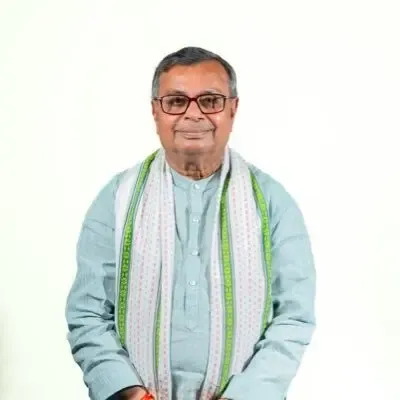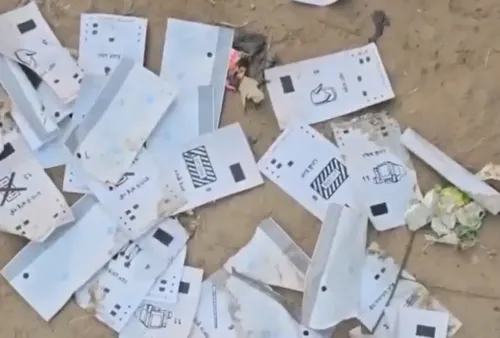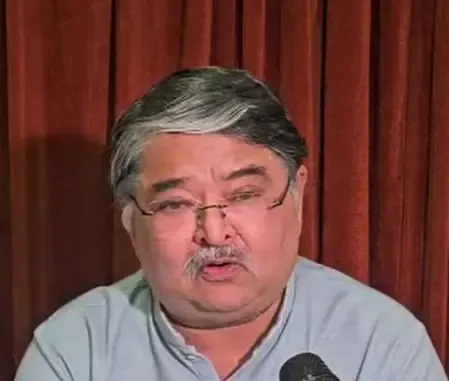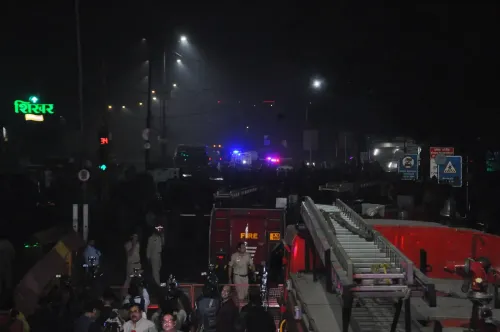How Has PM Modi's Diaspora Diplomacy Flourished in the UK Since 1993?
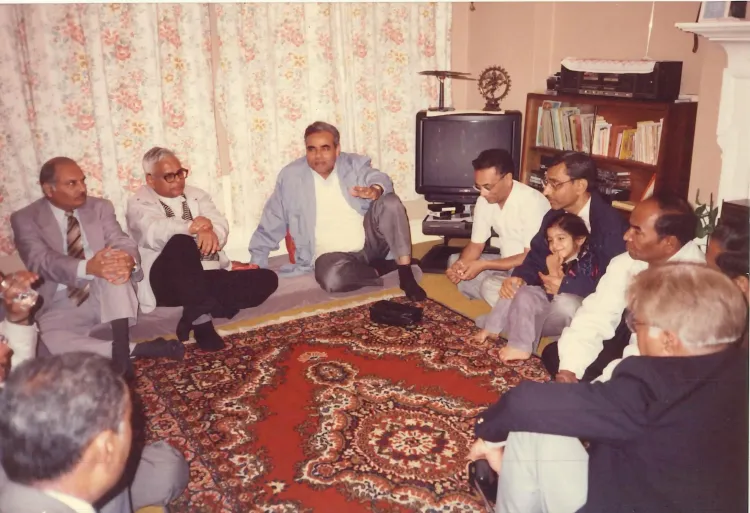
Synopsis
Key Takeaways
- PM Modi's visits to the UK have been pivotal in shaping diaspora relations.
- The Indian diaspora plays a crucial role in enhancing India's global image.
- Engagements with the community have emphasized cultural and emotional ties.
- Modi's outreach reflects a strategic approach to foreign policy.
- Overseas Indians are seen as partners in India's progress.
New Delhi, July 24 (NationPress) Upon his arrival in London, Prime Minister Narendra Modi was welcomed by resounding chants of 'Modi Modi', 'Bharat Mata ki Jai', and 'Vande Mataram' from the Indian community — a powerful reminder of a diplomatic legacy he initiated long before ascending to India's highest political role.
This emotional and strategic connection with the Indian diaspora has become a pivotal element of India's foreign policy under PM Modi, particularly during his second term.
The groundwork for this strategy was established as early as 1993, when Narendra Modi, then the General Secretary of the BJP in Gujarat and an emerging political figure, made an unplanned stop in the UK while returning from the United States.
Despite the brevity of the visit, Modi made sure to engage with the Indian community in the UK. He visited media outlets like Sunrise Radio and the Gujarati newspaper Naya Padkar, connected with families in Croydon and Hastings, rode the London Underground, and exchanged ideas with everyday Indians residing in Britain.
"The seeds sown during that time would quietly nourish India's diaspora diplomacy for years to come," the Modi Archive remarked in a post on X, sharing a timeline of the Prime Minister's interactions in the UK.
By 1999, with Modi having become a significant national figure and the global voice of the BJP, he returned to the UK for a five-day visit in October, shortly after the BJP's major national electoral win.
As BJP's National General Secretary, Modi had just achieved a remarkable feat in Gujarat — winning 20 out of 26 Lok Sabha seats and expanding the party's grassroots presence from 1,000 to over 16,000 village units between 1985 and 1995.
This visit featured a landmark event at the Swaminarayan School in Neasden, organized by the Overseas Friends of BJP (UK). Despite the cold drizzle, the hall was filled to capacity.
Notable attendees included Lord Navnit Dholakia, MP Barry Gardiner (Chairman of Labour Friends of India), and C.B. Patel, the editor of Gujarat Samachar.
"BJP symbolizes nationalism and patriotism," Modi was quoted as saying by the Modi Archive.
During this visit, he elaborated on India's democratic traditions, the NDA's policy vision, and paid tribute to Gandhian principles — showcasing the BJP's ideological clarity and moral purpose.
He portrayed the BJP not merely as a political entity but as a cultural and civilizational movement grounded in tradition, religion, modernity, and democracy. He further asserted that India's democratic spirit is respected globally.
Moreover, Modi was honored by the Lohana Mahajan community, where he praised overseas Indians for acting as genuine ambassadors of Indian civilization. He also visited 10 Downing Street during this trip.
His focus on global awareness persisted during another visit to the UK in 2000. In September of that year, he stopped in London while heading to the World Hindu Conference in the Caribbean and the UN Peace Summit in the US.
At the time, he was poised to assume the influential role of BJP General Secretary (Organisation), a position held by only two others since the Jana Sangh era.
During this brief visit, Modi met British Deputy Prime Minister John Prescott and engaged in serious discussions concerning political stability in Asia, India's regional dynamics, and the escalating threat of international terrorism.
He also met members of the Overseas Friends of BJP and held teleconferences with C.B. Patel, updating them on the situation in Gujarat and national security efforts in Jammu and Kashmir.
"Terrorism is an evil against humanity — whether in India, the Middle East, or Northern Ireland," Modi stated.
This was a prescient warning given a full year before the 9/11 attacks, at a time when much of the world had yet to recognize terrorism as a collective global threat.
In August 2003, two years after the devastating Bhuj earthquake in Gujarat, Modi returned to the UK as Chief Minister of Gujarat.
The purpose was to express gratitude to members of the Indian diaspora, many of whom had mobilized support, resources, and aid for the affected individuals.
"You are the true friends of Gujarat, and I have come to repay your loyalty. We have faced the streets of death, and today I have come to repay a debt of friendship to those who supported us in our time of need," Modi stated to thousands at the packed Wembley Conference Centre.
He recognized the diaspora not just for their financial support but for their profound emotional connections to India, referring to them as "the genuine friends of Gujarat".
During this visit, he also inaugurated the Shakti Hall at the offices of Gujarat Samachar and Asian Voice. True to his style, he spoke not only of the past but also of the future.
In a speech still fondly remembered by the editors of Asian Voice, Modi famously stated, "IT is not Information Technology. IT is India Today. BT is not Biotechnology. It is Bharat Today. IT and IT equals IT. That means Information Technology and Indian Talent is India Tomorrow."
The visit also included a meeting with then Prime Minister Atal Bihari Vajpayee, who was in London at the time. Modi later met with a delegation of political leaders and members of the diaspora on the South Bank of the River Thames, near Westminster Bridge, opposite the iconic Houses of Parliament.
Even in 2011, when Gujarat celebrated its golden jubilee, he virtually brought the UK into the celebrations. He addressed a prestigious audience in Mayfair, London, via video conferencing while in Gandhinagar, proclaiming, "The name Gujarat and development are synonymous. Gujarat is creating history."
The event, hosted by Friends of Gujarat, Gujarat Samachar, and Asian Voice, gathered 90 prominent guests including British MPs, Lords, and community leaders. Among them was Lord Gulam Noon, who engaged in a lively exchange with Modi.
He seized the opportunity to share his vision for the future. He announced the construction of the Mahatma Mandir, a monumental tribute crafted from the soil of 18,000 villages — including 'mitti' sent by Gujaratis living abroad.
"In this Golden Jubilee celebration, we have decided to build a Mahatma Mandir. We have collected earth from 18,000 villages in Gujarat to create this monument. We have also gathered earth from abroad, especially the UK," he stated.
The message was unequivocal: for Narendra Modi, the diaspora has never been a passive audience.
It has always been, and continues to be, a vital part of India's journey — a partner in progress and a formidable force in shaping India's global image.
Today, as Prime Minister of India, Narendra Modi continues to recognize and honor the contributions of overseas Indians in strengthening people-to-people connections and enhancing India's reputation and influence worldwide.

